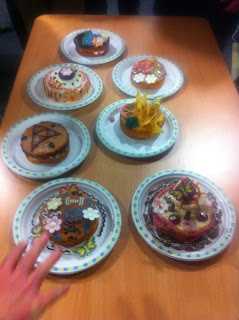 |
| Proper lager at the Fulford Arms |
The procedures and rituals surrounding the defense of a PhD thesis are different in every country. In the Netherlands it has evolved into a bit of theatre, though still with a serious purpose: the actors are the candidate, possibly accompanied by up to two so-called
paranymphs, in dress coats; and the members of the Graduation Committee, which can number up to 8, in togas (if they are professors) or suits. The paranymphs' function was originally to support the candidate in his/her defense or even to take over in case of need, but nowadays they are merely ceremonial and would be very scared if asked for help in answering a question. There is up to an hour of question time, and this can be quite nerve-racking, but the outcome is practically certain: if there were any doubt, it should have been voiced before. All in all there is a clear festive element to this: typically, friends and family turn up in large numbers. Afterwards it's party time!
I have once been an examiner in England: in fact that was here in York, for the thesis of Mike Dodds. The procedure here could hardly be more different. The concept of
defense is replaced by a that of a
viva (pronounced vaiva) - short for
viva voce, "by word of mouth": a posh phrase for an oral examination. The viva takes the form of two examiners locking themselves up with the candidate and taking an unbounded length of time to go through the thesis in gruelling detail. "Unbounded" here really means that there is no a priori limit to the duration: vivas of up to four hours are no exception. Another major difference is that it is the rule rather than the exception that a candidate passes
with minor corrections, which means that there is still work to be done afterwards (sometimes up to a year afterwards!) before the thesis is formally approved and the degree awarded. You can also pass with major corrections, or pass without corrections, but I am told the latter is really rare.
You can have long arguments about the relative merits of these systems. Certainly the viva is a much more thorough examination, but it has the very unfortunate consequence that there is no natural moment to celebrate! The viva is not public, no one knows when it will be over so you can hardly schedule any reception or other festivities; and anyway, there may be a substantial amount of work left to do, which is hardly conducive to a festive mood.
 |
| Sam and Lucy at the Woolpack |
On Friday afternoon, after a day of meagre results and slow progress, I got a mail from Sam (she of the social events) that
+Lucy Buykx was celebrating the conclusion of her viva (minor corrections) last Wednesday, and all were invited who felt like coming. Though I didn't know Lucy, I was intrigued by the name which I thought must surely be Belgian, and being used by now to semi-crashing parties of this kind I felt hardly any compunction in taking the invitation at face value. It turned into a jolly evening, spent successively at the
Glasshouse (on campus), the
Deramore Arms (just off-campus), the
Fulford Arms (further up the street in the direction of the city) and the
Woolpack Inn (just outside the gates of the old city). The last two were new to me. I met a number of new people: apart from Lucy of course (
not Belgian, she seemed a bit taken aback when I suggested that: the name is originally Dutch but mangled up generations ago in Australia) I also had an extended conversation with
+Jon Sandles about football - he's a big Man United fan, immediately mentioned the only other Twente-York connection I am aware of, to wit Steve MacLaren, the ex-coach of FC Twente who was born in York (see
my very first post). The party was bigger of course, but two names in one night is not bad.
 |
| England (with a bit of Scotland and Ireland) |
All in all the evening was very instructive: apart from seeing the insides of two new pubs, one of them with live music (which is actually a very common phenomenon here), I learned about
faghags, a word of which, after a slightly embarrassing but ultimately hilarious mistake from my side, I will not quickly forget the meaning; and
parkrun, an international organisation scheduling 5 km runs throughout Europe - although it appears it has not yet arrived in the Netherlands - with a weekly occurrence on the York horse race track on Saturday morning! One and a half times around the track equates to 5 kilometers, apparently. This I will most definitely give a try! Finally, I also received an geography lesson on the basis of a most amusing abstraction of England - see photo.
The last two pubs were worryingly empty for a Friday night. I have been told that there are several hundred pubs and bars in York (I have not yet quite grasped the difference between a pub and a bar), but if each of them hosts less than 10 visitors then that is not sustainable. Maybe it is also still a matter of traditional closing times: the English used to have to get their drinking done before 23:00 o'clock, so around midnight everyone has had their fill and the night is over. Indeed a tentative plan to proceed to the Willow came to nothing. No problem, no doubt there will be other occasions.











































